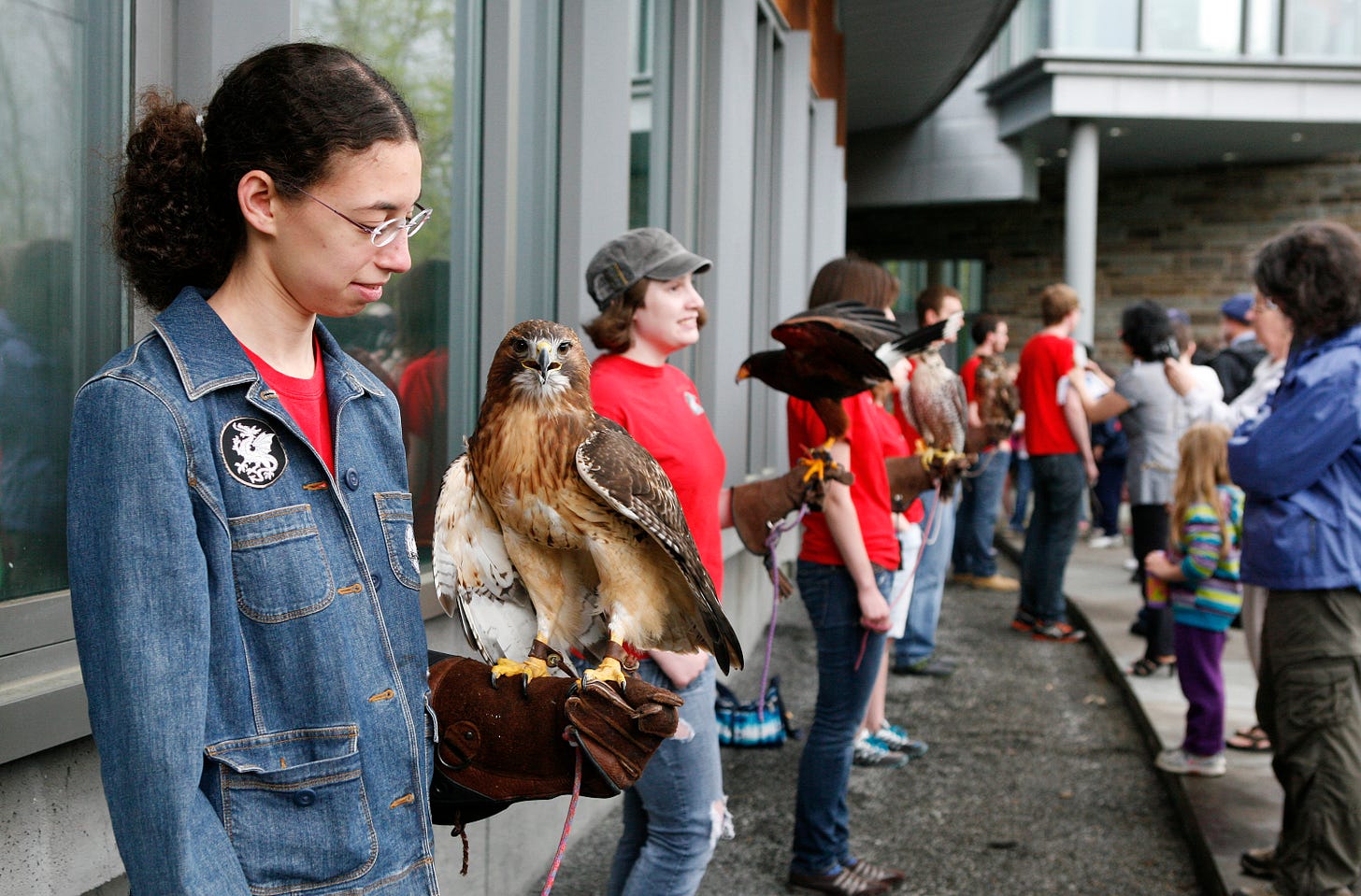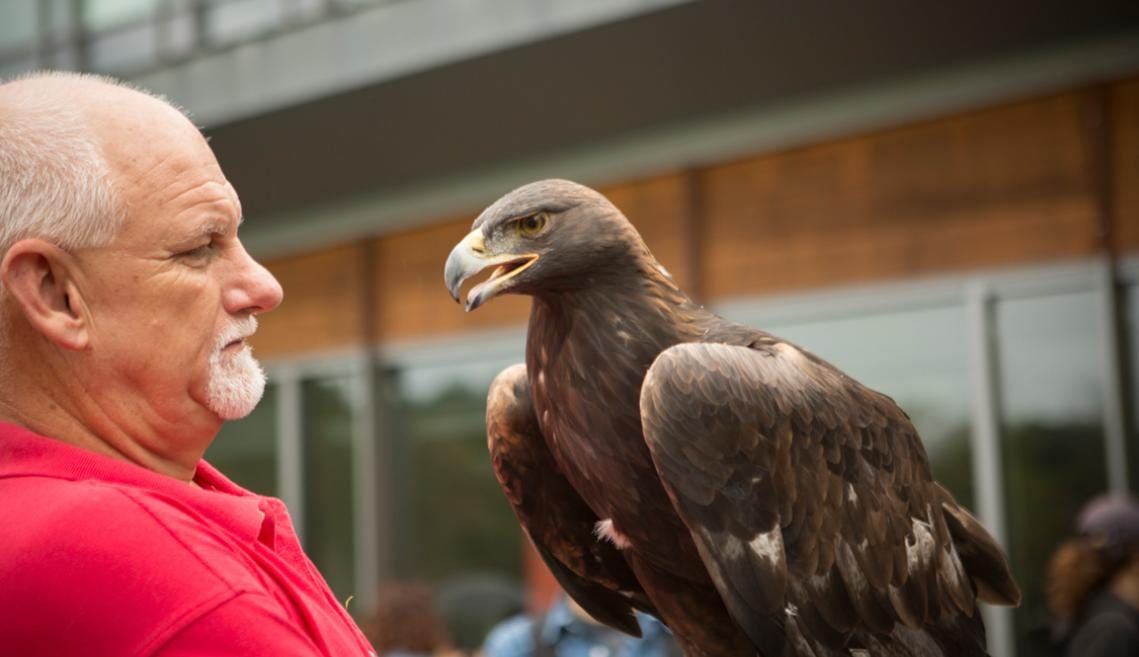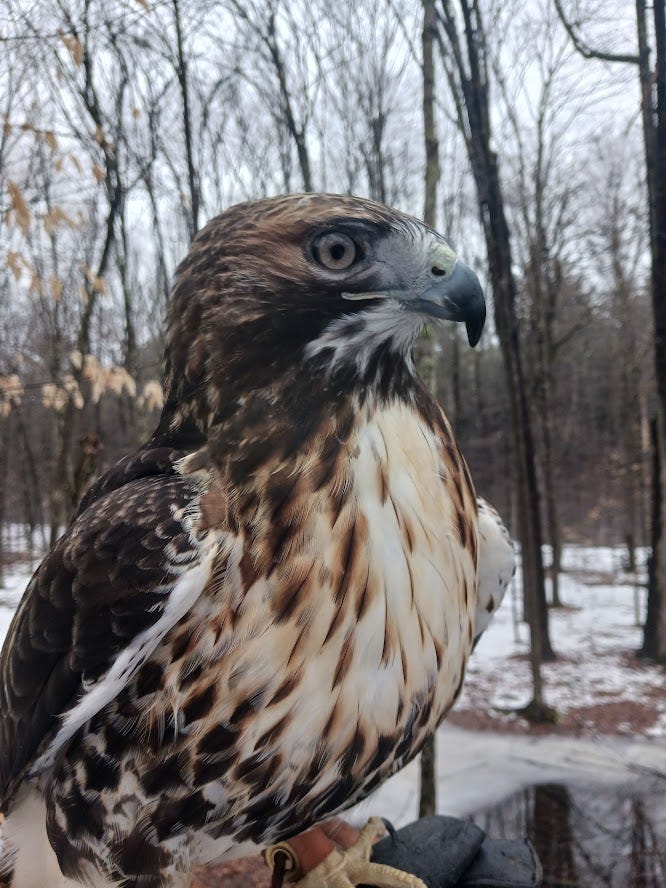My Heart on My Fist, Part 2
How love and experience with the wildness of birds helped me come to terms with my anxiety.
I won’t say that I chose the university I attended to for the specific reason that the Animal Science department hosted a small collection of rehabilitated, non-releasable raptors. I will say that when I was visiting the college, on that grand tour my parents and I took across the Northeast that only made my anxiety worse, I met the director of the raptor program, we got to talking, and when I was accepted, he mysteriously ended up as my academic advisor.
I was roped into working for the raptor program as soon as I set foot on campus, though no persuasion was needed. I was eager as anything. Why weren’t all the other students around me also falling over themselves for the chance to exist near a Spectacled Owl? Barely a week into this new and frightening university experience, working around the raptors was nearly all I could think about, and it covered my homesickness like a hood.
We called where the birds lived the Barns. They were modeled after the first Peregrine Falcon captive breeding facilities, the ones that had saved the species from extinction in the east in the 1970s. The birds were trained as education ambassadors, for undergraduate students to learn about wildlife medicine and husbandry, and to practice environmental education using ambassador animals. We housed Northern Goshawks, Harris’s Hawks, Eurasian Eagle Owls, Barred Owls, a Golden Eagle, and a queen of a Gyr-Saker-Peregrine hybrid. The new first-years who were interested in helping, including myself, bummed rides out to the Barns from seniors with cars every Saturday morning. Throughout our regular duties, we did learn to handle the birds, but we newbies were mostly good old ice-chipping, chicken-butchering, poop-scrubbing slaves. But it was Golden Eagle poop.
The group of students involved—pre-veterinarians, ecology majors, the odd engineer—began petering out as the weather got colder and exams approached. A few crazy ones like me stayed, of course. You couldn’t keep me away.
The first raptor I held on my gloved hand was a male Red-tailed Hawk. He stood tall and ramrod straight, with his pale yellow feet tucked neatly next to each other, the toes curling lightly around my thumb. He didn’t even touch my gaze with his peppery brown eyes; instead, he peered out the window at some enticing motion in the field. With my left forearm parallel to the ground, my elbow forming a ninety-degree angle, those eyes were nearly level with my own. He wasn’t heavy, but I was instantly conscious of a deep, buried strength. Having him sit on my glove was like having someone lean on me, unconsciously, as if I weren’t there.
The hawk seemed unconcerned, unambitious. He was as much a part of the wild landscape as a tree or a pond. And at that moment, I mattered to him about as much as a tree—not a whit.
This, I think, is the crux of what was and is so vitally important to me about wild animals. They are under no obligation to show themselves to us, physically or emotionally. Perhaps, with serious dedication to the task and tremendous amounts of work, we may earn their trust. Gaining this trust is a stamp, a certificate of achievement, though it is ephemeral and will be taken away by a misstep. But the prize is a glance into their eyes, to be able to spend a moment watching them when you are unimportant to them, to glimpse the very nature of their wildness. This is a token so valuable and rare that it makes stroking the animal, taking a wild thing into a home, or any other humanizing comfort seem demeaning and distasteful. I am addicted to these glimpses of wild life.
Working with the birds filled the same kinds of holes as food, water, and sleep. Between Saturday morning Barn chores, Thursday afternoon feeding (rotated between six students and the director of the program), and speaking roughly one education presentation a week, I am still scratching my head now, wondering how I managed to also attend class and cultivate any human relationships at all. They say you make time for what’s important to you, and I certainly did that. The other students and I traveled with eight or nine of the birds in a fifteen-passenger van to the small towns scattered around the college to give educational presentations. On top of studying for exams, I learned the natural history of each one of the seventeen species I worked with, and launched myself without hesitation into teaching others about them. In my third year, I became the student director of the education arm of the program, and it was my job to schedule the outreaches, reserve the van, and ensure all the presentations went off without a hitch.
I never really had a fear of public speaking, which is incongruous with the rest of my worry-driven personality. Many, if not most, people are incredibly uncomfortable speaking in front of a crowd, whether to strangers or friends (which can sometimes be harder) and get sweaty palms, hot face and neck, heart pounding in the ears. These symptoms were familiar to me, and public speaking wasn’t an activity I normally sought out, yet speaking to a crowd with a bird on my fist was somehow a completely different experience.
But the explanation is obvious: my audience was never looking at me. In fact, they couldn’t have cared less about me. I had learned this secret way back when I was watching the very owl presentation that had set me on this path—we are all looking at the bird. Bring out a live animal, and just like that, everyone’s attention is swallowed by the icon of wilderness in their midst.
My friends in college had become enormously important to me—my boyfriend, now husband, was selflessly supportive if not entirely comprehending of my obsession. Keeping excellent grades floated near the top of my priorities list, and believe it or not, I did get a decent amount of sleep. What began to suffer, because I was simply not paying it any mind, was my mental health.
My thinking was: it shouldn’t have mattered. My life was full. I dearly, truly loved my friends, my work, my space. The college I attended kicked me in the rear academically, but I took this as a welcome chance to prove myself, as I always did. I was well fed, my family stood behind me like a rock, and I had no reason to think I was dying.
It was the end of my junior year of college. I looked at the world around me and saw glowing, happy, functional people, and I knew there was something deeply wrong with me by comparison.
I was afraid, specifically, of having a heart attack. Any time my pulse rose to something resembling a slow jog, I closed inward like a flower. If I thought I’d skipped a beat, or felt a strange tremor, I got so worked up I could barely breathe. I existed with two fingers against my neck, feeling for any abnormality like a hypochondriac. The internal workings of my cardiac system formed an unending spiral in my brain, and I tensed my muscles so much that they constantly ached. This, of course, triggered even more concern, as I knew that pain in the chest and arm were symptoms of a heart attack.
I knew this because of the Fourth of July party, eight years earlier. My extended family and I were sitting around a bright white table in a fancy restaurant on the edge of a lake. Appetizers had been ordered and brought and I was twelve, working away at a bread crust while my grandmother told a story. My dress itched a lot. Then my ear caught the hushed, concerned tones of my mother and father speaking only to each other.
Dad had his hand on her back, and was leaning towards her, looking deeply into her face. She had her palm on her chest. “Well, it…” she began, and moved her hand up to her shoulder, then spread her fingers wide like the rays of the sun and traced them down her left arm. “…and here.” She brought her hand back to the center of her chest and closed her fingers in a delicate fist.
My grandmother’s story petered out. The rest of the table had gone quiet now, too. In a rush, Dad decided that they should go to the hospital, and Mom didn’t argue. They both got up and left.
We were quiet for a while longer. My aunt suggested it was probably indigestion. My grandmother agreed. I nodded along. Taking another bite of the bread crust, I found suddenly that it tasted like sand.
“It’s nothing, I’m certain,” my aunt said to me, but the tears had begun to drip out of my eyes.
Decades earlier, when she was fourteen, my Mom’s own father did not survive complications from heart surgery. She and Dad were afraid in the car to the hospital, they told me later. Dad drove quickly. Mom’s pain did not lessen.
But she laughed when he turned to her and asked, “Should I be, um, driving over lawns?”
Mom survived the heart attack. She was forty-six, healthy, and there was no reason she should have had it in the first place. The random, inexplicable nature of the event did not help us recover as a family. In fact, it took more than a year for Mom and me to adjust to the terror of that day, but—well, not completely.
Temple Grandin explains the difference between fear and anxiety: “If you step on a snake, you feel fear. If you think about stepping on a snake, you feel anxiety.” We all felt fear for many days after Mom’s heart attack, waiting for it to happen again, for something else to go wrong—like a family hiding in their basement, waiting for the tornado. But blessedly, the other shoe never dropped.
Eight years later, I discovered that I had, in fact, been waiting for it all this time.
I was essentially having a panic attack that lasted months. I don’t know what triggered it, but nothing eased it. That’s how some mental disorders work, though: they are irrational and inexplicable. The simmering and (I assumed) perfectly natural anxiety that had been bubbling away within me since I was a child had finally boiled over. I understood it was going to kill me.
I knew, I knew—with the same part of my brain that knew the scientific names of all the North American raptors—that I was one of the luckiest people on Earth, that I had every reason to be glowing, and happy, and functional right alongside my friends. But I felt I was being held together by strings and sludge. I felt like I’d broken a bone, and no one could see. The feeling seeped into every crevice, every available crack, and worked away at them, widening and advancing them, until things I knew did not feel correct.
The damage was obvious to the people closest to me. I spent nights in bed shaking like I’d been out in the frigid air. I said things without thought or care to my friends—people I adored—and I cannot believe they forgave me. It was often impossible to pay attention to anything outside of my own body, and it took all my concentration to keep from falling apart in a stiff breeze.
I am lucky, I think, because other people in my situation would have seen the solution as obvious. Countless minds wonder at the difficulty of continuing to live in a situation like mine, and they decide to try not living. I was lucky because that was the very source of my fear: I had so much to live for, so much yet to do. I was trapped inside a mind that thought it was dying, was afraid of dying, and had grown impervious to arguments to the contrary. My overwhelming panic stemmed from the fact that I figured this horrible pain would be with me for the rest of my hopefully very long life.

Early on, in my sophomore year, I was given the opportunity to work one-on-one with a bird at the Barns. The goal was to help train and socialize the bird, and to make sure someone was keeping a close eye on that individual. Wild birds, like most wild animals, hide signs of illness or distress until it’s almost too late to treat, so it helps to get to know the animal’s normal, healthy behavior as clearly as possible. This meant a commitment of about an hour every day, so there went the last of my free time.
The two birds in need of a daily caretaker were a twenty-six-year-old male Harris’s hawk, who had for two decades been the director’s personal falconry bird, and a hatch-year male merlin barely out of the wild on a permanent shoulder injury. The merlin was not quite seven ounces, a sharp thing made of fawn grey-and-brown feathers, with two gigantic liquid black eyes pointed with worry at anyone moving in his vicinity. He had the face of a larger, fiercer falcon, perfectly miniaturized. He was loud, especially for the size his lungs must have been, and I was not long in making my decision. I craved the chance to know this new bird, this partly discovered bird, so I could have the challenge of him and so I might be his first human.
Many of the miles I put on my first car were accumulated driving back and forth from the Barns for my work with the merlin. We named him Emrys. He’d come from the prairies of Utah, and broken his right wing in such a way that left him permanently unable to fly. He could maintain altitude fairly well, especially if given a good surface to push off from, but he would tire quickly and circle down toward the ground. When I offered my gloved hand, Emrys would step confidently onto it, look around for the tidbit of meat he was certain he’d earned, and then slim down to a thin sliver of himself as we walked together out of his enclosure—vigilant. I trained Emrys to do little hops from a fixed perch to my baited glove as exercise, but he was rather nervous about that. He’d land on my fist hesitantly, almost daintily, as if he wasn’t sure that this thing being asked of him was entirely correct or proper, but he would give it a good show. I let myself become wrapped in his imperious timidity.
Emrys was my daily solace; with him I needn’t spend time in my own head. I couldn’t. This merlin required all my attention, both physical and mental, whenever I was with him. I could bury myself in the constant, essential care of a fierce little wild thing. Like working with my hands to build, or navigating an unfamiliar road, training Emrys was a kind of meditation that allowed me outside the prison of my diseased mind and let me see that something had to change.
I got better. Oddly, I haven’t much to tell about my recovery, other than the most important point: it happened.
Six years after I graduating, discussing this crisis in wonderful past tense with my husband, I discovered that my brain had deleted things. It was world-altering, in the way that suddenly becoming privy to a dark family secret or all at once losing one’s religious faith must be. I thought it was something that only happened in fiction, but friends and family could corroborate memories I was present for but do not have. I suppose I should be grateful for this quirk of the human mind, yet I can’t help but find it disturbing.
I know I didn’t get better on my own—no, not without a lot of help in all the forms it takes—but I am better, much better, and I am not even afraid that it will happen again. If it does, then I know how to deal with it, don’t I? Not alone.
I worked at the Barns until the day I graduated, when they had to kick me out (“to bigger and better things”). For a while, I would daydream about meeting my eleven-year-old self, now, and telling her this story, about what her life will be like in the decades ahead. That someday she can expect to hold an owl on her gloved fist, and know him well, and that this will not even be the coolest thing that happens that day. That the way is rough, but not impassable. I’d tell her the two things I feel now, sitting here and writing this: that if I were to die tomorrow, I would die happy and fulfilled, and yet I want to live forever, to keep experiencing things I’ll never tire of.
If you love what you read, let me know by dropping by my Ko-fi page:





Beautifully expressed, Anna.
BTW, my first held raptor was also a male red-tailed hawk - Little Red, later known as Neddick. I stood there, eye to eye with this magnificent creature and froze. My trainer encouraged me to relax. “Don’t worry, he won’t bite”! That was 20 years ago, and I’ll never forget that amazing experience.
Your title is brilliant in all it’s connotations. Thank you for this essay.